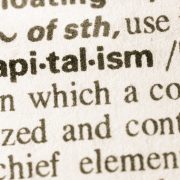Because its denial is incessantly repeated, the following truth must be incessantly restated: we ordinary Americans are fabulously rich and getting richer. The irony is that we are so very materially prosperous – with a prosperity that is shared by nearly all Americans – that we take our happy condition for granted.
Most of us don’t see this prosperity, at least not for what it is. Our material prosperity, although historically unprecedented, is now so commonplace that, for us Americans in 2020, this prosperity appears to be the natural state of the world. It appears simply to exist – to happen like rainfall happens in the tropics. But of course, widespread material prosperity doesn’t just happen. It didn’t happen for 99.9 percent – literally 99.9 percent – of human existence. The prosperity that we all today enjoy must be not only created but, also, continually recreated.
Entrepreneurs must be inspired to innovate. Investors must be motivated to take risks. Countless individuals must have incentives to save, to work hard, to daily cooperate productively with people whom they do not know, and to avoid using scarce resources wastefully. Yet it is only in the past two or three centuries that most of us have been led most of the time to mostly act in these ways that generate the tremendous shared material bounty that most of us take for granted.
Be More Amazed…
The ‘Wow!’ factor of a tiny fraction of this bounty becomes obvious immediately when pointed out. In 2020 it’s not difficult to inspire someone to marvel at relatively recent innovations such as smart-speakers, GPS, streaming music, and hip-replacement surgery. But these new marvels are hardly the whole story.
The real measure of our prosperity is in what, for us, is mundane: running drinkable water over a wide range of temperatures, hard roofs and floors, refrigeration, artificial lighting, inexpensive garments and bedding made with machine-woven cloth that withstands being cleaned with powerful inexpensive detergents in powerful affordable machines, widespread literacy, mastery at using the electromagnetic spectrum, liability insurance for drivers and for homeowners, well-stocked supermarkets, fresh blueberries in New York in January, ice cream in New Orleans in July, air travel, automobiles, air-conditioning, aspirin, antibiotics…. You, Mr. or Ms. Reader, will have no trouble extending this list for pages.
Each and every one of these seemingly humdrum features of our everyday lives will inspire you to exclaim “Wow!” if you ponder the almost incredible amount of human effort and undesigned coordination that takes place regularly to make these almost-miraculous goods and services so routine that they seem humdrum.
Accustomed to constant access to an abundance of such marvels, we fail to recognize them for the marvels that they are. Instead, we focus only on the failure of this marvelous reality of ours to be even more marvelous. With our glass 99 percent full – and with this fullness seemingly produced and guaranteed by some mysterious laws of nature – many of us are apoplectic both that the “distribution” of this bounty isn’t as ideal as we can imagine, and that our glass has yet to be filled even further.
Such complaints would be more tolerable if those who issue them were to reveal some appreciation for just how minor are today’s economic problems relative to the enormous good that economic growth has already brought about and continues to bring about. But no such appreciation is apparent.
Just once, I want to hear someone who worries about climate change acknowledge that we today are fortunate to be able to worry about climate change. Just once, I’d love to encounter a politician or professor who wags his finger angrily at the “uneven distribution” of income or wealth note that any randomly chosen ordinary person in the United States today is likely to be materially far richer – in very many ways – than was the richest American of a mere century ago.
And just once, I long to be surprised by a “social-justice warrior” conceding that at least some of today’s alleged problems might actually be mirages conjured by the market economy’s successes.
… But Don’t Be Shocked
Consider, for example, the much-noted reduction over recent decades in Americans’ geographic mobility. This reduced mobility is said to be a major reason why increased trade with China inflicted on Americans what is now known as the “China shock” – namely, a slower than expected adjustment of American workers to increased imports of goods from China. (There is, by the way, some confusion about exactly what the “China shock” finding is. Some people interpret this finding in the manner in which I describe it in the previous sentence. Yet other people interpret it to be a finding that increased trade with China caused a permanent reduction in net American employment. The “China shock” researchers themselves are unclear on this matter. For purposes of my essay here, however, nothing much turns on which interpretation is correct.)
While Americans’ reduced geographic mobility might reflect real problems – such as housing costs in booming cities made artificially high by land-use restrictions – it might also, at least in part, reflect increased prosperity.
Most people prefer to live in some locations over other locations, but to satisfy such ‘locational preferences’ is costly. And so just as when we become richer we are more likely to satisfy our preferences for nicer automobiles and larger homes, as we become richer we also are more likely to satisfy our preferences for living in our favorite locations.
A blue-collar resident 50 years ago of Allentown, PA, might have had a strong attachment to that locale but, having lost his job, couldn’t afford to keep living there. His best economic option was to move. But suppose that today we see a blue-collar worker remain in Allentown despite being unemployed. What should we conclude? The conclusion leapt to by many pundits is that today’s unemployed worker is so much less likely than was the typical worker in the past of finding a new job elsewhere that today’s unemployed worker sees no point in moving. Out of despair, today’s unemployed worker simply stays put.
Perhaps. But given that there’s been no long-term uptick in the national rate of unemployment, this pessimistic conclusion is likely mistaken. A more plausible conclusion is that unemployed Americans today can better afford to stay put in their preferred locales and wait for new jobs to come to them rather than them move to different locales in search of new jobs.
This increased affordability of staying put might come in the form of greater purchasing power of workers’ savings, or in the form of more generous family, private, and public assistance for unemployed workers. Regardless of the source of this increased affordability of locational preferences, such increased satisfaction of locational preferences is evidence that ordinary Americans are today richer than were ordinary Americans in the past.
No sensible observer argues that the American economy is free of problems and flaws, or that ordinary Americans face no real economic challenges, some of which are daunting. But the incessant drumbeat of negativity about the U.S. economy and about globalization – and the blinkered focus on problems (real and only apparent) divorced from the larger context of the economy’s successes and of Americans’ stupendous prosperity – gives us a dangerously inaccurate sense of the state of the economy and of ordinary men’s and women’s relationship to it. And this inaccurate sense, in turn, will fuel policies that destroy rather than promote our ability to continue to prosper.













